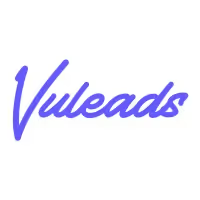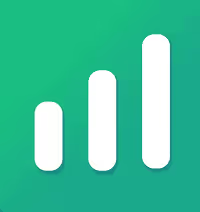Compass Alternatives
Find your Compass replacement. We analyze 10 alternatives in a detailed comparison to help you select the right developer portal for your team.
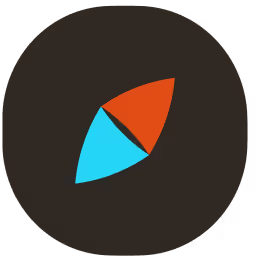
Compass is a tool many teams use for valid reasons. It excels at managing contacts and tracking candidates over time. The tool is also effective for optimizing field service processes, giving it an edge in certain use cases.
But every tool has limits. Some users mention it's mainly for database management and can have a cluttered desktop view. We've analyzed the best alternatives, comparing their pros and cons to Compass, to help you choose. Let's get started.
Consider 11x for Your Sales Team
For teams that want digital workers to handle sales tasks, 11x offers a solution. It provides autonomous agents designed to execute sales development functions. This can be a practical option for companies that want to augment their sales efforts with automated support.
11x is a GTM platform that uses AI agents to manage the sales process. Its agent, Alice, finds prospects, runs outreach, and updates the CRM. Julian qualifies inbound leads and books meetings. The platform unifies tools for data enrichment, outreach, and email warmup, removing the need for separate solutions.
Compass Alternatives
The following sections provide a detailed breakdown of each Compass alternative. We will analyze pricing, core features, and the specific pros and cons of each tool when compared to Compass.
1) Guru
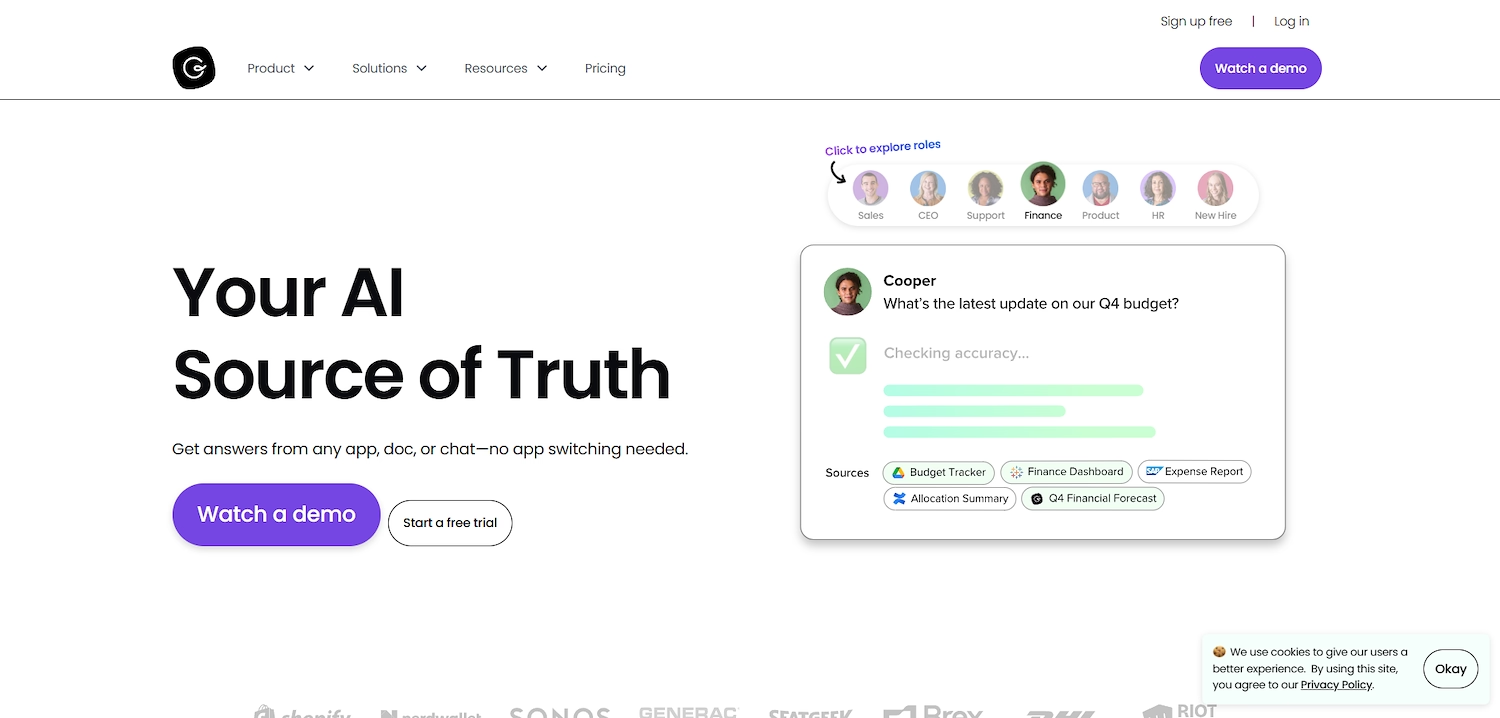
Guru is an AI platform that unifies company information into a single knowledge base. It connects with your existing applications, documents, and chat tools. The system delivers context-aware answers directly within your workflow, so users do not need to switch between apps to find information.
For sales teams, it provides real-time answers inside a CRM, access to battle cards, and helps generate sales collateral to maintain a consistent message.
Guru's Main Features
- Provides semantic, context-aware search that finds answers from any connected tool or document.
- Offers role-aware AI bots that return accurate answers and can be trained on your company's content.
- Delivers answers directly inside browsers, Slack, Microsoft Teams, and ChatGPT through extensions.
- Uses automatic reminders and subject matter expert alerts to keep content current and verified.
How Guru Compares to Compass
Average Review score: 4.7/5 stars based on 2,170 G2 reviews.
- Guru functions as a centralized knowledge base, unlike Compass, which focuses on database and contact management. This allows teams to store and share company information in one place.
- It delivers information directly within existing workflows through browser and Slack integrations. This differs from Compass, which primarily operates as a separate application for database tasks.
- The tool uses AI for context-aware search, helping users find answers without needing exact keywords. This provides a more flexible search experience compared to the database search functions in Compass.
- Its system includes features for content verification, using alerts to ensure information stays up-to-date. Compass, as a contact database, does not have a comparable system for verifying internal knowledge articles.
Where Guru Is Less Suited Than Compass
- Guru does not provide native contact management or CRM functions. This is a key difference from Compass, which is built to track external contacts like clients and candidates.
- The platform lacks any tools for field service optimization. In contrast, Compass offers specific features designed to manage and improve field operations.
- Some users find the search function can be inefficient without exact keywords. This may be a drawback for teams that need the structured data retrieval found in a dedicated database tool like Compass.
Pricing and Cost-Effectiveness
Guru offers a free plan for a single user and a paid tier starting at $15 per user per month. Compass does not provide public pricing information, so a direct cost comparison is not possible without contacting the company for a quote.
2) Bloomfire
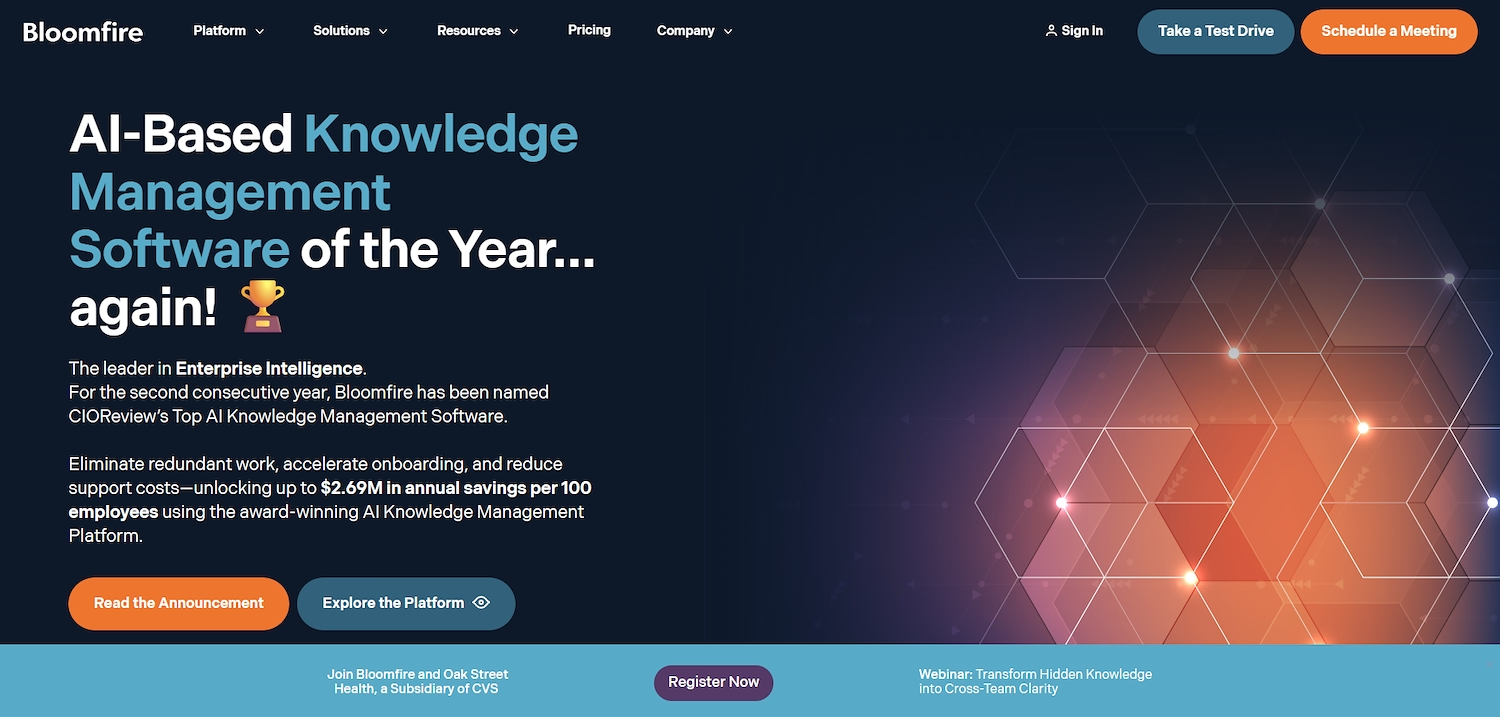
Bloomfire is an AI knowledge management platform. It captures an organization’s collective information and makes it searchable to provide real-time insights. This helps centralize institutional knowledge for teams across the company.
Use cases include a research hub, a customer support knowledge base, and employee onboarding. These applications help teams access curated information to support their work.
Bloomfire's Main Features
- The AI enterprise search deep-indexes all content types, including video and audio, and enables federated search across multiple repositories.
- AI authoring tools provide automatic content tags and generative summaries, while content management supports single-source publication and version control.
- A conversational AI engine finds answers to user questions, prevents duplicate queries, and tracks response times from subject matter experts.
- Moderation tools include approval workflows and version control, and an analytics suite offers real-time dashboards with exportable data sets.
How Bloomfire Compares to Compass
Average Review score: 4.6/5 stars based on 491 G2 reviews.
- Bloomfire centralizes all types of company knowledge, such as documents and videos, into a single searchable hub. This is different from Compass, which primarily manages external contact information.
- Its AI-powered search can find information within various file types, including video. This offers a more flexible search experience than the structured data retrieval in Compass.
- The platform provides tools to create and verify internal knowledge articles, complete with version control. Compass lacks these content authoring features as it focuses on data entry.
- A built-in Q&A feature connects employees with subject matter experts for answers. This internal collaboration tool is a function not found in Compass's external-facing system.
Where Bloomfire Is Less Suited Than Compass
- Bloomfire does not offer native contact management features. This is different from Compass, which is designed to track external contacts and manage client relationships.
- The platform lacks tools for field service optimization. Compass, in contrast, provides specific functions to manage and improve operations for teams working outside the office.
- This tool is built for internal knowledge sharing, not for managing structured external data like candidate pipelines. For that specific task, Compass provides a more dedicated database environment.
Pricing and Cost-Effectiveness
Bloomfire does not provide public pricing, and Compass's pricing is also not available. For the most accurate and up-to-date pricing information, we recommend visiting Bloomfire's official website.
3) Glean
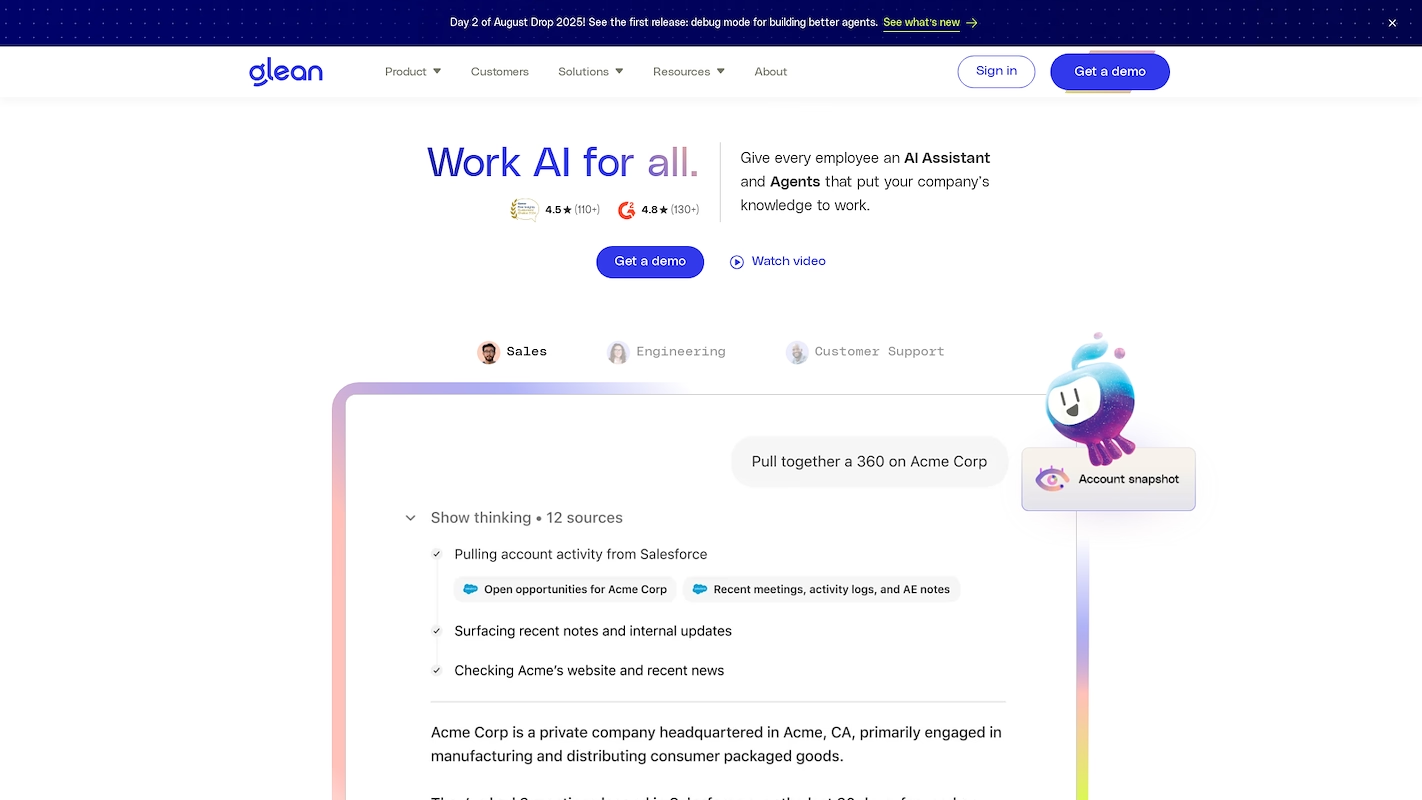
Glean is a work AI platform that gives employees an AI assistant and enterprise search. It unifies data from workplace applications so people can find, understand, and create content from company knowledge. The platform can summarize documents and automate workflows.
Use cases include knowledge discovery and content generation, which can support sales enablement. The tool also helps with employee onboarding to reduce ramp-up time.
Glean's Main Features
- Answers questions, searches across apps, and drafts new material using a personal AI copilot.
- Builds multi-step agents with a low-code tool to automate projects and business processes.
- Delivers permissions-aware results from across all enterprise content using hybrid semantic and keyword search.
- Unifies structured and unstructured data from hundreds of workplace apps into an enterprise knowledge graph.
How Glean Compares to Compass
Average Review score: 4.8/5 stars based on 134 G2 reviews.
- Glean connects to all company applications to create a unified knowledge graph for enterprise-wide search. This differs from Compass, which functions as a siloed database for contact information.
- It includes a personal AI copilot that answers questions and drafts content using internal company data. This provides an internal support function not found in Compass's contact management system.
- The tool allows users to build low-code agents to automate multi-step business processes. This is a different approach from Compass, which focuses on manual data entry and tracking.
- This platform unifies and searches both structured and unstructured data, such as documents and messages. In contrast, Compass is designed primarily to manage structured data within its database.
Where Glean Is Less Suited Than Compass
- Glean does not offer native contact management or CRM functions. This is different from Compass, which is built to track and manage external contacts like clients and candidates.
- The platform lacks any tools for field service optimization. In contrast, Compass provides specific features designed to manage and improve operations for teams working outside the office.
- It is not designed for manual data entry as a primary database. Compass provides a more dedicated environment for teams that need to build and manage structured contact lists from scratch.
Pricing and Cost-Effectiveness
Glean and Compass do not provide public pricing, which prevents a direct cost comparison. For the most accurate and up-to-date pricing information, we recommend visiting Glean's official website.
4) Atlassian Confluence

Atlassian Confluence is a team workspace for knowledge and collaboration. It provides a central location for teams to create content, work on projects, and organize information together.
For sales teams, it can act as a single source of truth for playbooks and product updates. This structure supports consistent communication and access to materials, which helps sales professionals perform their duties with confidence.
Atlassian Confluence's Main Features
- Offers flexible pages for real-time documents and includes whiteboards for visual collaboration.
- Atlassian Intelligence helps auto-write, summarize, and automate documentation tasks.
- The platform provides out-of-the-box connections to applications like Jira, Trello, and Slack.
- It organizes content into logical spaces with a page tree and powerful search to keep knowledge discoverable.
How Atlassian Confluence Compares to Compass
Average Review score: 4.1/5 stars based on 3,859 G2 reviews.
- Confluence offers a collaborative workspace where teams create and share internal knowledge on flexible pages. This differs from Compass, which focuses on external contact data within a structured database.
- The tool integrates with other Atlassian products like Jira and Trello to connect project management with documentation. In contrast, Compass operates more as a standalone system for its database functions.
- It includes features like version history and templates to manage the lifecycle of internal documents. Compass lacks these content creation tools as its purpose is data entry for contacts.
- Atlassian Intelligence automates documentation and summarizes content within the platform. This internal support function is not available in Compass's contact management system.
Where Confluence Is Less Suited Than Compass
- Atlassian Confluence does not have built-in contact management features. This is different from Compass, which provides a dedicated system to track and manage external contacts like clients or sales leads.
- It does not offer features for field service management. Compass, on the other hand, includes tools to help coordinate and optimize tasks for teams that work in the field, a function Confluence does not cover.
- Some users may find Confluence less effective for managing structured data sets like client lists. Compass is built as a database, which makes it a more direct tool for data entry and tracking specific external contacts.
Pricing and Cost-Effectiveness
Atlassian Confluence offers paid plans starting at $10 per month for team collaboration. Compass does not publish its pricing, so a direct cost comparison is not possible without obtaining a custom quote from the company.
5) Slite
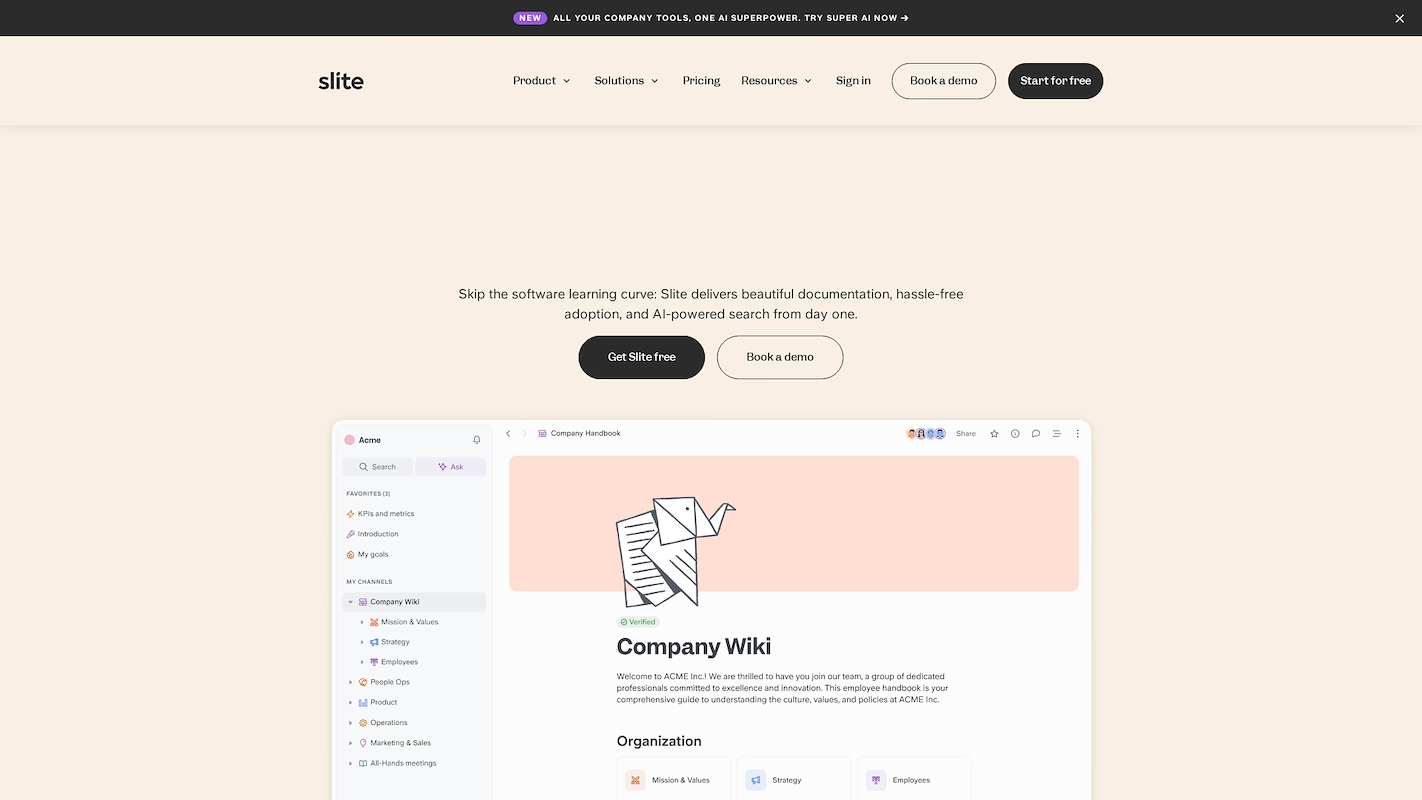
Slite is a platform for teams to document and share knowledge. It acts as a central hub for company information, which helps keep everyone on the same page.
For sales teams, it can house playbooks, competitor analysis, and product updates. This gives professionals a single source for materials to perform their work and maintain a consistent message.
Slite's Main Features
- Offers a collaborative document editor with a distraction-free interface to write, edit, and format pages.
- Includes an AI search feature called "Ask" that lets users conversationally query the knowledge base for referenced answers.
- Provides an AI-powered wiki generator that automatically creates an initial documentation structure for new workspaces.
- Features a knowledge management panel to bulk-manage documents and clean up outdated content.
How Slite Compares to Compass
Average Review score: 4.6/5 stars based on 263 G2 reviews.
- Slite functions as a central hub for company knowledge and documentation. This is different from Compass, which focuses on managing external contacts in a database.
- It offers an AI search that answers conversational questions. This provides a more flexible way to find information compared to the structured data search in Compass.
- The platform includes a collaborative editor for teams to create and edit documents together. In contrast, Compass is built for individual data entry, not shared content creation.
- Tools for version history and content verification help keep documents current, a feature set for internal content that Compass does not have.
Where Slite Is Less Suited Than Compass
- Slite is not designed for customer relationship management. Teams that must track external contacts, like sales leads or clients, will find Compass offers a more specialized environment for that task.
- It does not support field service management. Compass includes specific functions to help organize and improve the efficiency of mobile teams, which is a capability Slite does not have.
- The tool is intended for unstructured knowledge like articles, not for structured data entry. Compass operates as a database, making it more suitable for building and managing precise lists, such as candidate pipelines.
Pricing and Cost-Effectiveness
Slite offers paid plans starting at $8.00 per user per month. Compass does not provide public pricing information, which prevents a direct cost comparison without requesting a quote from the company.
When to Choose 11x for Sales
We have covered several knowledge management tools. If your main goal is to automate sales tasks, 11x is a specific option. It provides autonomous agents to handle sales development, which is a different approach from the other platforms discussed in this article.
With 11x, AI agents run your sales playbook. Alice finds accounts, enriches data, and handles outreach, while Julian qualifies leads and schedules meetings. The platform unifies tools for data and outreach, replacing other solutions in a GTM stack.
Book a demo to see the platform in action.
6) Notion
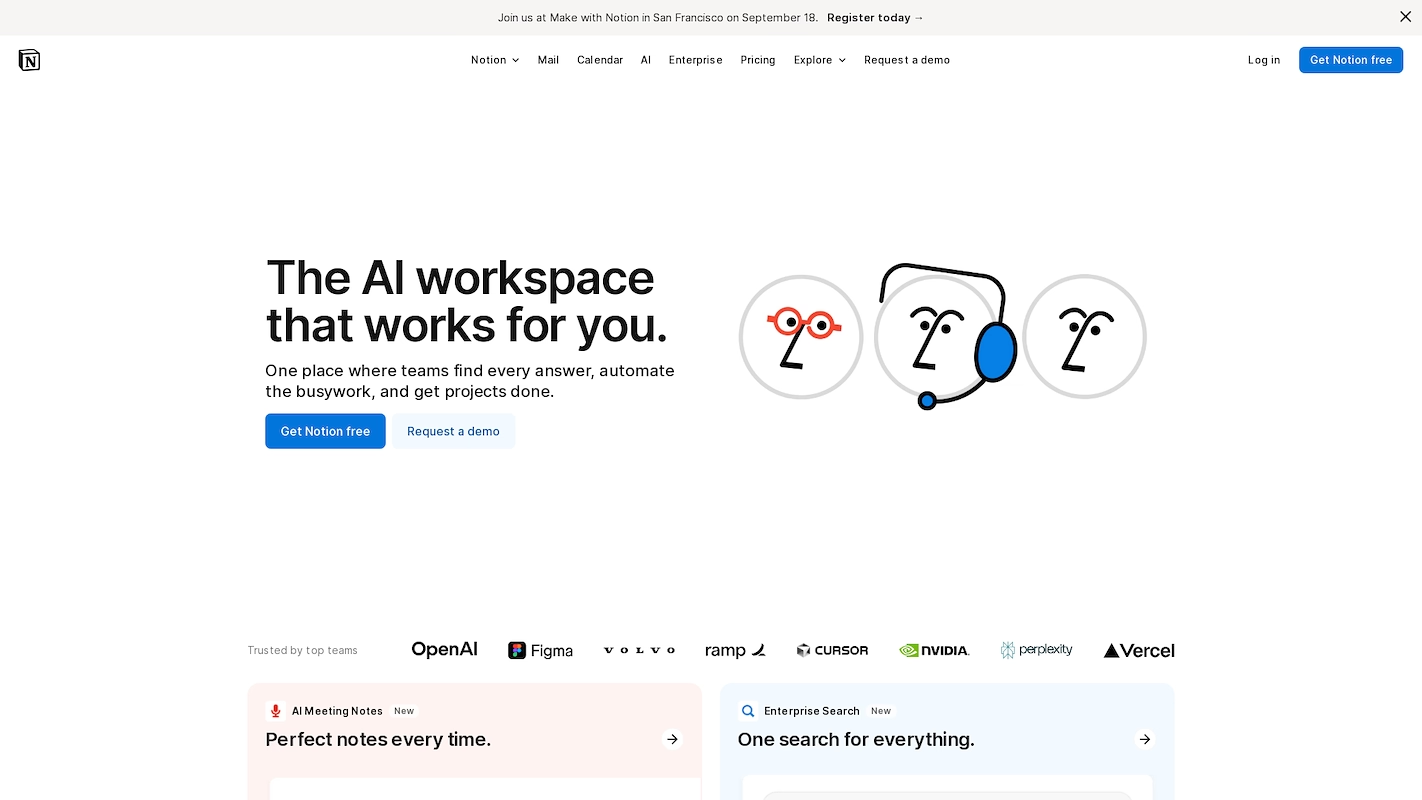
Notion is a connected workspace for teams to write, plan, and organize projects. It unifies notes, documents, and task management in a single place. Sales teams use it as a central hub for playbooks and competitor analysis.
This structure gives sales professionals direct access to information. Such access helps them stay aligned with company objectives and product details.
Notion's Main Features
- Includes Notion AI to assist with writing, content generation, and task automation.
- Provides end-to-end project and task management to organize work in a single space.
- Allows teams to create and maintain centralized company knowledge bases with a wiki feature.
- Enables users to publish pages from the workspace directly to the web as a site.
How Notion Compares to Compass
Average Review score: 4.7/5 stars based on 6,803 G2 reviews.
- Notion offers a connected workspace for documents and project management. This is a different approach compared to Compass, which functions as a dedicated database for contacts.
- It includes an AI assistant to help write content and automate tasks. Compass does not have a similar AI feature for internal team support.
- The platform provides project management tools like task lists and calendars. This is a function not found in Compass, which focuses on contact tracking.
- Teams can create a central wiki to organize company knowledge in one place. This contrasts with Compass, which is built to manage external data rather than internal documentation.
Where Notion Is Less Suited Than Compass
- Notion does not have built-in CRM capabilities. This is different from Compass, which is designed specifically to monitor external contacts and manage sales pipelines.
- It lacks any features for field service management. In contrast, Compass includes tools to optimize operations for teams that work outside of a central office.
- Some users find its open-ended structure is less suitable for strict data management. Compass provides a more rigid database environment, which can be better for tasks that involve candidate records.
Pricing and Cost-Effectiveness
Notion offers paid plans starting at $10 per user per month, providing cost predictability for teams. In contrast, Compass does not publish its pricing, which prevents a direct cost comparison without obtaining a custom quote from the company.
7) Lucy
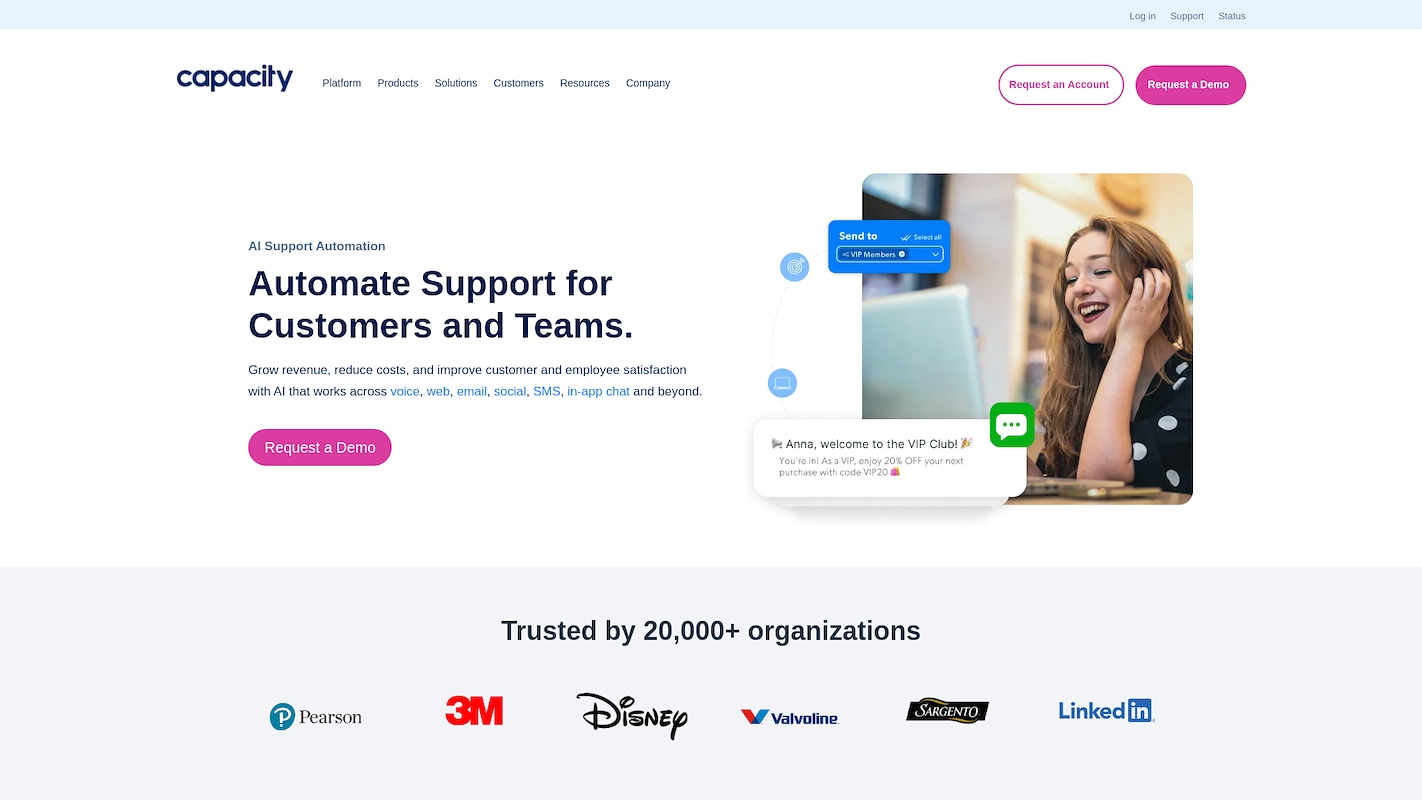
Lucy is an AI knowledge management platform that acts as an answer engine. It connects to a company's data systems, like SharePoint and Dropbox, to find information for employees. The platform unifies enterprise knowledge to break down data silos.
Sales teams use the tool to access marketing collateral, case studies, and product information. This access helps them prepare for meetings and respond to client questions.
Lucy's Main Features
- Acts as an answer engine to provide direct responses to employee queries.
- Connects to company data systems such as SharePoint and Dropbox to source information.
- Unifies enterprise knowledge from multiple sources to break down internal data silos.
How Lucy Compares to Compass
Average Review score: There are not enough G2 reviews to provide buying insight.
- Lucy automates the processing of PDF purchase orders from emails. This is different from Compass, which relies on manual data entry for contact management.
- It creates sales orders directly in your ERP system. In contrast, Compass functions as a separate database for contact information without this direct integration.
- The platform focuses on the order-to-cash cycle by handling purchase orders. Compass, on the other hand, tracks contacts and candidates through a sales or recruitment pipeline.
- This tool extracts information from documents like PDF purchase orders. This differs from Compass, which is built to manage structured data that users enter manually.
Where Lucy Is Less Suited Than Compass
- Lucy does not offer native CRM functions to manage client relationships over time. Compass, in contrast, is built to track customer interactions and manage a sales pipeline.
- The platform lacks any tools for field service optimization. This makes it unsuitable for companies that need to coordinate and manage teams in the field, a core function of Compass.
- It is not designed for recruitment purposes, such as tracking candidate pipelines. Teams that need to manage applicant data will find Compass provides a more suitable database structure for that task.
Pricing and Cost-Effectiveness
Lucy offers a Standard Plan for $1,885.00 per month. Compass does not provide public pricing, so a direct cost comparison is not possible without contacting the company for a quote.
8) Obie
Obie was a knowledge management tool that provided access to information within a company's workflow. After being acquired by Lessonly and then Seismic, its technology is now part of the Seismic platform. It was designed to surface answers for sales and enablement teams.
Obie's Main Features
- Provided answers to questions directly within Slack and other chat applications.
- Used a browser extension to deliver knowledge without switching tabs.
- Offered federated search to find information across multiple connected apps.
- Included features to verify content and suggest when documents needed updates.
How Obie Compares to Compass
Average Review score: 4.6/5 stars based on 113 G2 reviews.
- Obie acted as an internal knowledge base, surfacing answers in apps like Slack. This is different from Compass, which is a database to manage external contacts.
- It integrated directly into workflows with a browser extension and chat bots. Compass operates primarily as a separate application for its database functions.
- The tool provided federated search across multiple company applications. This contrasts with the structured data search within the Compass database.
- Obie included features to help keep internal documentation verified and up-to-date. Compass does not have a comparable system for internal knowledge.
Where Obie Is Less Suited Than Compass
- Obie is no longer available as a standalone product since its acquisition. Companies must now consider the broader Seismic platform, which may not fit their needs.
- The platform did not have native CRM or contact management features. Compass is built specifically to track external contacts and manage client data.
- It lacked any tools for field service optimization. In contrast, Compass offers functions designed to support teams working in the field.
- The tool was not designed to manage structured data like candidate pipelines. For this purpose, the database environment of Compass is more direct.
Pricing and Cost-Effectiveness
Since Obie is no longer a standalone product, its original pricing is not applicable. Its features are now part of the Seismic platform, which requires a custom quote. Compass also does not provide public pricing, so a direct cost comparison is not possible.
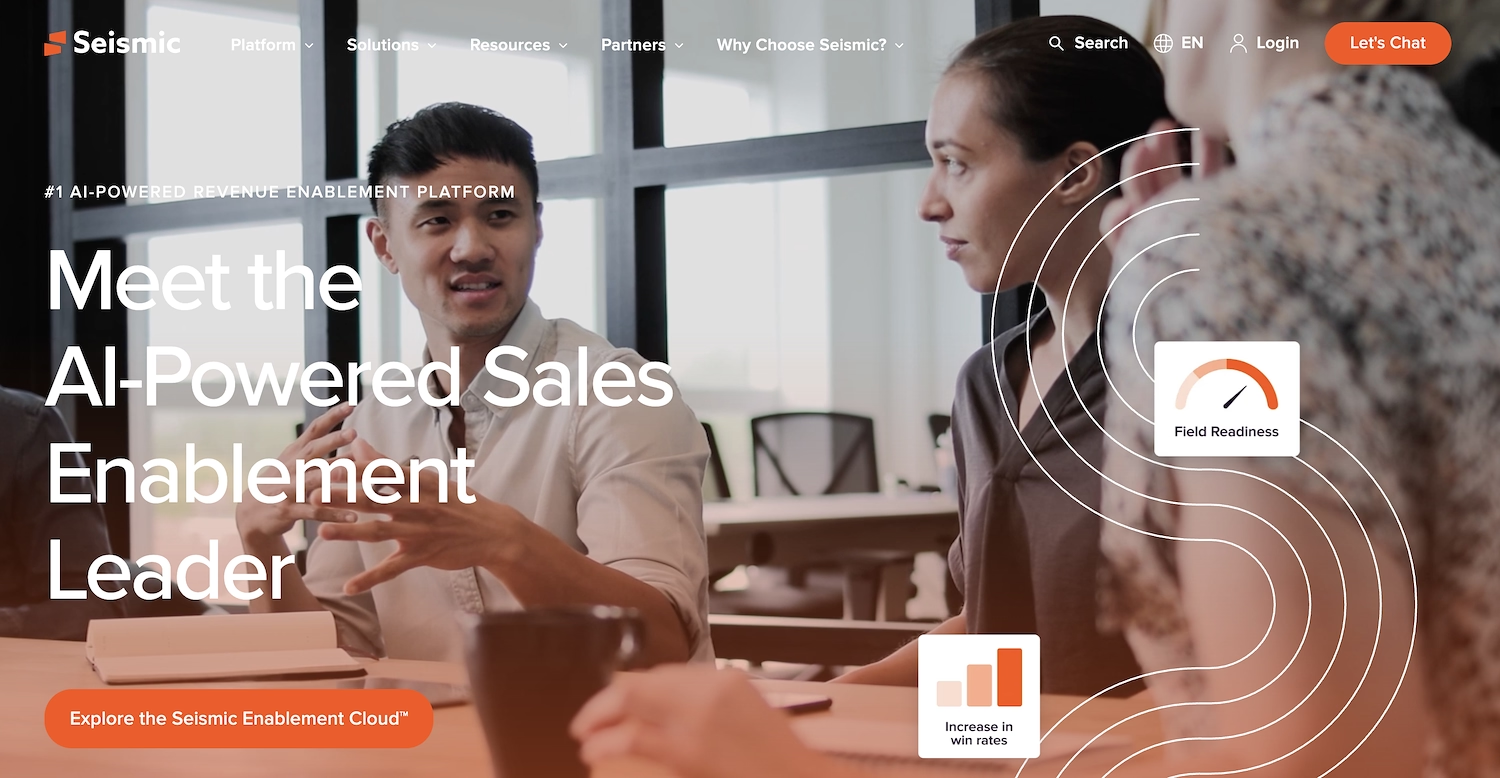
Obie was a knowledge management tool that surfaced answers for sales teams within their workflow. After acquisitions by Lessonly and then Seismic, its technology is now part of the Seismic platform. Obie is no longer a standalone product.
Obie's Main Features
- Acts as a digital teammate to help users share and access team knowledge.
- Automates tasks and helps users utilize Google features.
- Provides a mail merge feature to complete tasks in less time within G Suite.
How Obie for G Suite Compares to Compass
Average Review score: 5.0/5 stars based on 1 G2 review.
- Obie for G Suite automates tasks within Google Workspace, which differs from Compass's focus on manual contact data entry.
- It offers a mail merge feature inside G Suite to complete communication tasks quickly, a tool not available in Compass's database system.
- The tool functions as a digital assistant for sharing team knowledge, whereas Compass manages external contact information.
- This platform integrates into Google Workspace to enhance existing features, while Compass operates as a separate application.
Where Obie for G Suite Is Less Suited
- Obie for G Suite does not have a native CRM function. In contrast, Compass is a dedicated system to track external contacts and manage client relationships over time.
- The tool lacks any features for field service optimization. Compass provides specific functions to coordinate and improve the efficiency of teams that work in the field.
- This platform is not for the management of structured data like candidate pipelines. Compass offers a more suitable database environment for such tasks.
Pricing and Cost-Effectiveness
Pricing for Obie for G Suite and Compass is not publicly available. This prevents a direct cost comparison, so teams must contact each company for a quote.
9) Sinequa
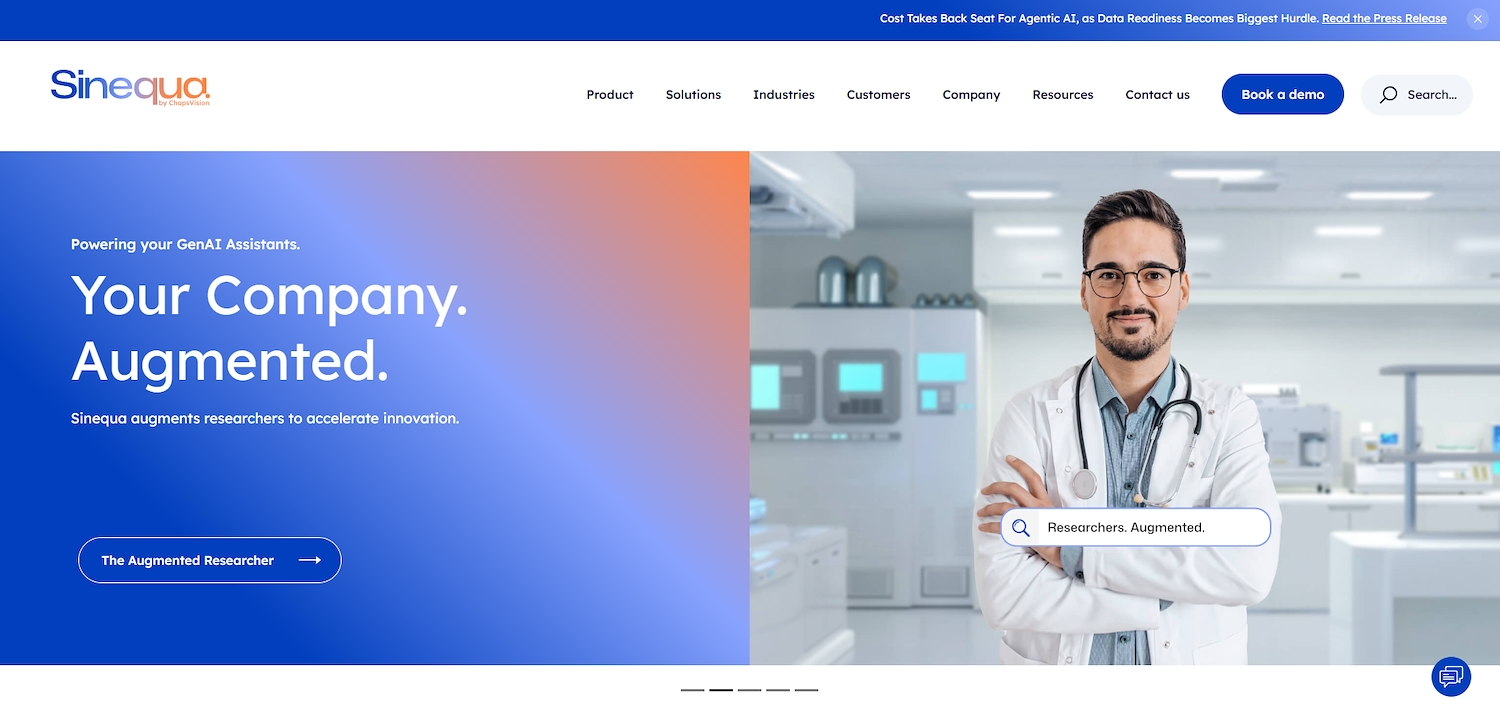
Sinequa is an intelligent search platform that connects to company data sources. It finds information from both structured and unstructured content across the enterprise, which creates a unified search experience for all company knowledge.
Sales teams use the platform to locate product specifications and customer history. This access helps them prepare for meetings and answer client questions with precise details.
Sinequa's Main Features
- Connects to over 200 applications and repositories, supporting 350 formats for both structured and unstructured data.
- Combines enterprise retrieval with generative AI (RAG) to power conversational agents within a secure framework.
- Includes built-in orchestration tools for system monitoring, performance tracking, and management of multiple applications.
- Scales to support deployments of over 400 million documents and 50 billion records for up to 200,000 employees.
How Sinequa Compares to Compass
Average Review score: 4.2/5 stars based on 4 G2 reviews.
- Sinequa connects to over 200 company applications to search both structured and unstructured data. This is different from Compass, which operates as a standalone database for contact information.
- It uses generative AI to power conversational agents that find information for employees. Compass, in contrast, is a system for manual data entry and does not offer this type of AI support.
- The platform includes tools to monitor system performance and manage multiple applications. This function for large-scale deployments is not present in Compass, which focuses on contact management.
- This tool is designed for enterprise-level use, with the capacity to handle hundreds of millions of documents. This scale differs from Compass, which is built to manage specific contact and candidate lists.
Where Sinequa Is Less Suited Than Compass
- Sinequa does not provide native CRM functions to manage client relationships. In contrast, Compass is built to track customer interactions and manage a sales pipeline.
- The platform lacks any tools for field service optimization. This makes it less suitable for companies that need to coordinate and manage teams in the field, a core function of Compass.
- It is not designed for recruitment purposes, such as tracking candidate pipelines. Teams that need to manage applicant data will find Compass provides a more suitable database structure.
Pricing and Cost-Effectiveness
Sinequa and Compass do not provide public pricing, which prevents a direct cost comparison. For the most accurate and up-to-date pricing information, we recommend visiting Sinequa's official website and contacting Compass for a quote.
10) Coveo
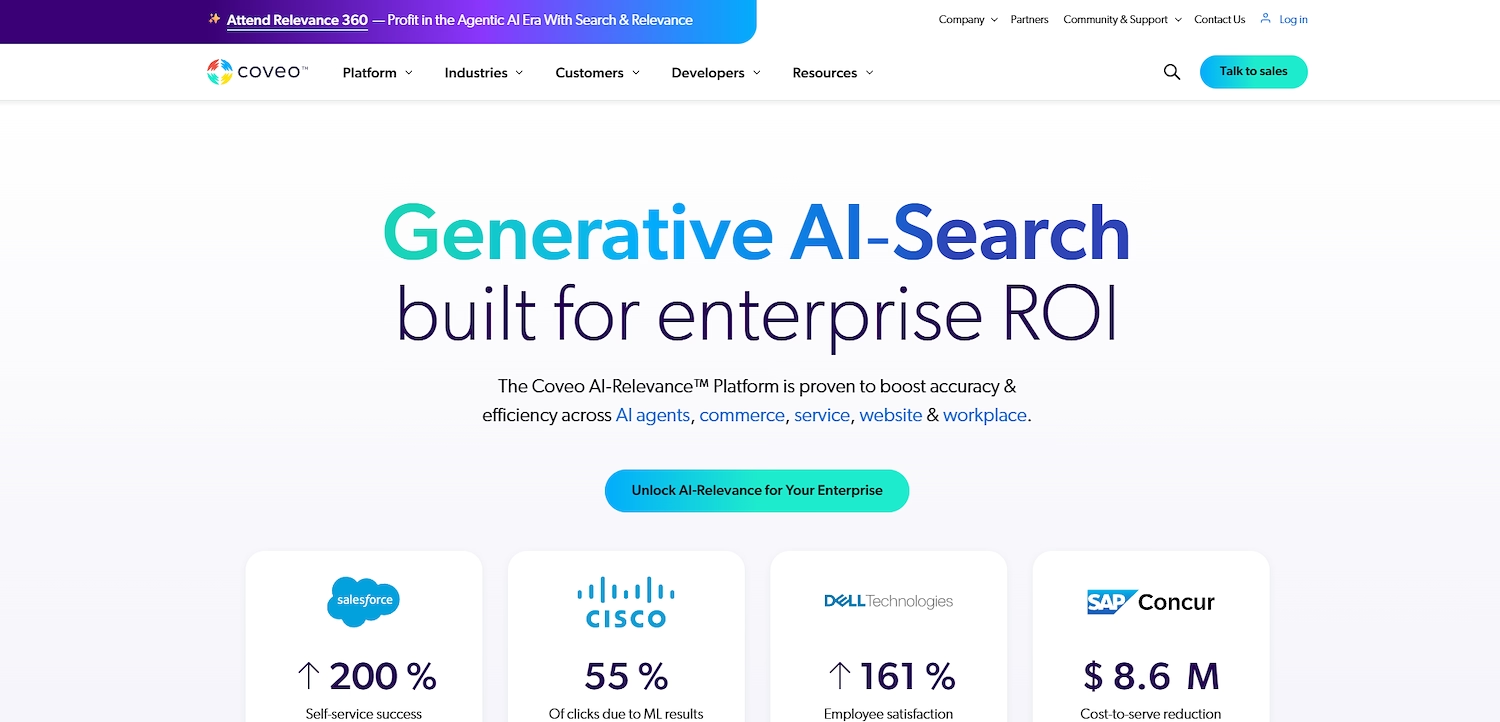
Coveo is an AI relevance platform that unifies content and data from various systems to deliver personalized experiences. For sales teams, it surfaces product information and relevant content directly within a CRM. This gives reps the details to close deals. The platform also offers insights into customer behavior, which allows sales professionals to tailor their approach.
Coveo's Main Features
- Unifies information silos across enterprise, social, and cloud-based systems with a unified indexing platform.
- Delivers hyper-personalization at each point of experience by unifying data with contextual and prescriptive accuracy.
- Provides AI-relevance that aligns with a user's context, needs, preferences, and intent.
- Offers faceted search, synonym support, and typo tolerance to refine search queries.
How Coveo Compares to Compass
Average Review score: 4.3/5 stars based on 134 G2 reviews.
- Coveo unifies information from different company systems, creating a single search point. Compass, in comparison, functions as a separate database for contact data.
- The platform uses AI to provide personalized search results that match a user's specific needs. This offers a more relevant experience compared to the standard database queries in Compass.
- It indexes both structured and unstructured data, allowing users to search across documents and other files. Compass, on the other hand, is built to manage only structured data within its database.
- This tool connects with enterprise systems like Salesforce to deliver information directly inside them. This differs from Compass, which works as a separate application for contact management.
Where Coveo Is Less Suited Than Compass
- Coveo does not have a native system for customer relationship management. Teams that need to track client interactions over time may find Compass offers a more direct solution for that specific task.
- The platform does not provide tools for field service management. This makes it less suitable for companies that need to coordinate mobile teams, a core function that Compass supports.
- Some teams might find Coveo less effective for managing structured data sets like candidate lists. Compass is built as a database, which makes it a more direct tool for manual data entry and tracking specific records.
Pricing and Cost-Effectiveness
Coveo and Compass do not provide public pricing, which prevents a direct cost comparison. For the most accurate information, we recommend visiting Coveo's official website and contacting Compass for a quote.
Which One Should You Go With?
Many variables factor into choosing a Compass alternative. This guide has presented several options to help you make an informed decision based on your team's specific needs and priorities.
If your focus is sales automation, 11x offers a different approach. Instead of a knowledge base, it provides AI agents to handle sales development. These agents find prospects, run outreach, and book meetings, which can augment your existing sales team.



